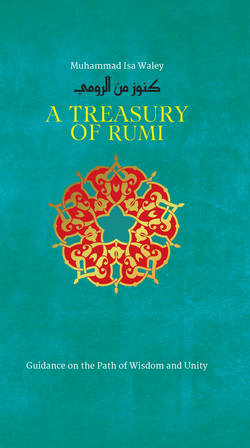Читать книгу A Treasury of Rumi's Wisdom - Muhammad Isa Waley - Страница 15
На сайте Литреса книга снята с продажи.
Оглавление6
The Real ‘You’
You don’t grasp that it is vital, although it is;
You too, in the end, will say: ‘It was vital’.
He is you – not this ‘you’, but the [true] you That is waiting and that will emerge in the end.
Your [true] you is buried inside something else.
I’m a slave to the man who can see his true self.
That which a young man can see in a mirror,
The spiritual guide can discern in a brick.
(M VI, 3774–3777)
Making the journey to God while following a spiritual guide, who possesses profound insight (alluded to in the last couplet), is the means to discover one’s true identity. The apparent ‘you’, the familiar one, is restricted to this three-dimensional world. You mistakenly suppose that to be the real ‘you’, but the reality of who you are is beyond those dimensions: in the realm of the spirit. The familiar self we are accustomed to talking to and hearing from a thousand times daily is the one we must learn to manage, in keeping with the responsibility our Creator gave us in making us human. A ‘brick’ (khisht) here probably means a piece of metal of the kind from which mirrors were made.
What an extraordinary creation is the human soul, in which completely opposite attributes can co-exist! Its lower and worse side craves to have the satisfaction of having everything its own way, and fears change. On the other hand, its higher and better side longs for change and is ready to embrace it; it longs to transcend its apparent limits (precisely because it is a human, not an animal, soul). ‘In its heart of hearts’ the soul yearns for true and everlasting happiness and is always aware that there is a price to be paid and there are changes that have to be made. After all, that is a paltry price to pay for an immeasurable and everlasting blessing.
Several times in the Holy Qur’an God swears an oath, invariably by some object of exceptional significance. In S‰rat al-Shams, ‘The Sun’ (91: 8–9), He swears ‘By the soul and that [Power] which formed it, then inspired it with its corruption (fuj‰r) or its God-consciousness (taqw¥). He who grows it (or purifies it, zakk¥h¥) prospers; he who buries it (or indulges it, dass¥h¥) fails.’ So here lies the supreme challenge on the Path: one must go forwards, out of the ‘comfort zone’, or else risk losing everything. ‘You don’t grasp that it is vital, although it is; you too, in the end, will say: “It was vital.”’
